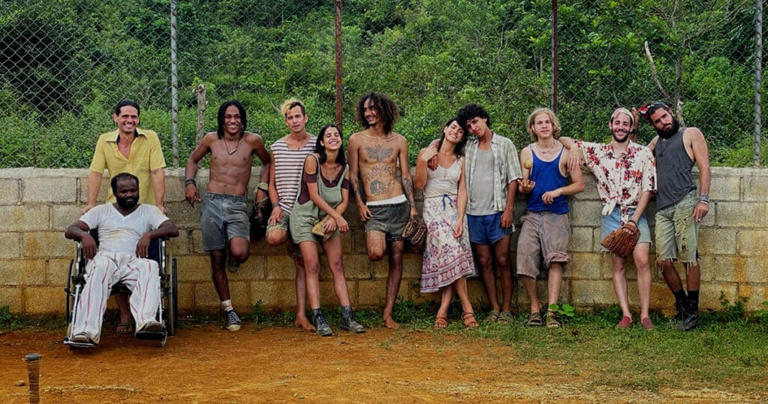Directed and written by Michael Schwartz and Tyler Nilson (The Peanut Butter Falcon), the film is inspired by actual events and set in Cuba’s punk subculture of the 1990s. Los Frikis is a powerful coming-of-age story centered on Gustavo (Eros de la Puente), who idolizes his older brother Paco (Héctor Medina) and his punk bandmates. As oppression and extreme poverty tighten their grip, the Frikis take a desperate and defiant stand by intentionally injecting themselves with HIV to gain refuge in a government-run sanatorium. In a world designed for isolation, they create their own anarchic utopia—an oasis of rock ‘n’ roll, joy, freedom, and acceptance.
While actual events inspire the story, the movie is not filmed in Cuba. Fidel Castro had a decades-long ban on rock music (the music he was said to be “of the enemy”). There was to be no listening to rock music or playing it live. In the story of Los Frikis, many people are struggling to obtain the most meager portions of food for their families. Two Cuban brothers, Gustavo (Eros de la Puente) and Paco (Héctor Medina), no longer have their parents and an uncle as a guardian, who also feels the same pressure from the economic crisis. Paco leads an underground punk band, still searching for the freedom to rock out and pushing the “Los Frikis” movement.
Acquiring food was difficult, and a scene of limited choice for a night’s meal is shown. This part of the film is not easy part to watch. It is evident that Gustavo is not as fearless as Paco, but they determine choices that must be made for their respective survival. While Paco suggests they seek separate ways to survive, Gustavo bails on his options and navigates his own way to stay close to his brother.
Paco (Héctor Medina) and his punk rocker friends learn about a government-funded sanatorium where people with HIV were housed with food, shelter, and their own beds. Despite not knowing much about the disease, they inject themselves with HIV, get tested, and live in isolation from the communities they know. Gustavo (Eros de la Puente) finds a way to be labeled as HIV positive. Before long, he finds himself transported to the same sanatorium as Paco but also finds love with the caretaker of the facility, Maria (Adria Arjona). Life seems like a utopia, but hiding from the Cuban government and other residents is also a hard way to live daily, looking over the shoulder for the worst day of his life.
Adria Arjona (Blink Twice, “Hit Man” Netflix) is an HIV-free caretaker, runs the sanatorium, and oversees meetings with government representatives. She is one of a few women in a cast that is very male-dominated among the ailing community. She is kind to everyone, but she finds something special in Gustavo. Eventually, they act on their mutual admiration, which is not safe.
Despite the great music of the era and the beautiful cinematography from Santiago Gonzalez, the reality of the death toll from the disease is not glossed over. They may have been given a glimmer of hope from news via video and other sources, but their lives by the sea with a sense of freedom last only so long.
Produced by: Phil Lord, Christopher Miller, Jordan Fudge, Jeremy Allen, Aditya Sood, Rebecca Karch Tomlinson, Tyler Nilson, and Michael Schwartz
Executive produced by Adria Arjona and Anthony Mark and Co-produced by Héctor Medina and Tess Cohen.
Source: New Slate Ventures, Wayward/Range, LM Production, A Lucky Treehouse Film
